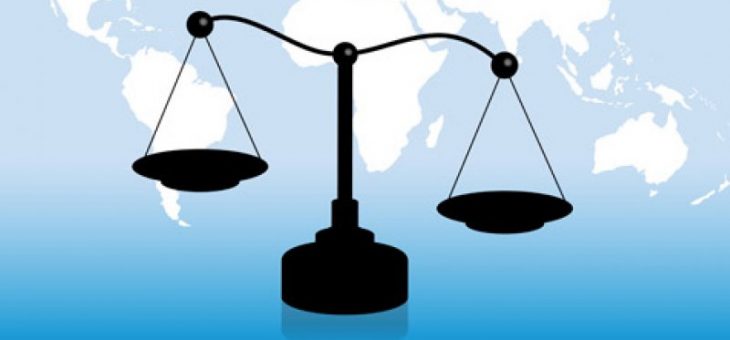All the rights and obligations that the population of a country has are enshrined in the articles of regulatory legal acts of the state. However, some issues are regulated by international law, which are enshrined in international legal acts. What are these documents, what features do they have? More on this later.

General concept
International legal acts are absolutely all written documents that are official in nature and have ever been signed by various (at least two) states or other representations that are subjects of international law. Such documents also include contracts and all kinds of agreements.
Those acts that, in their content, affect the field of human rights, often characterize them as international standards, as constitutions of various countries and other laws are written on their basis. In addition, the norms presented in the laws of states cannot in any way contradict the international standards.
Vivid examples of international legal acts on human rights are resolutions of interstate organizations, as well as all kinds of agreements (Helsinki Final Act, documents of the OSCE Copenhagen and Vienna Meetings). In addition, the most famous document of this type is the Universal Declaration of Human Rights, which was adopted in the postwar period - in 1948.
Features
All international legal acts have some features that unite them. First of all, each document of this nature is registered in accordance with a form clearly established by international law, and they all form a single system of international law. In addition, each international legal act is called upon to regulate a particular type of public relations - those that arise between two or more states. In the process of creating such normative acts, it is important that the subjects achieve a certain consistency with each other. Otherwise, the document will not comply with such principles of international law as voluntary conclusion of agreements and partnership.
Each normative act of an international character has a special purpose, which is achieved through a peace agreement and cooperation. The circle of persons to which the norms of such an act apply is mandatory prescribed in its content - as a rule, such are the people and the nation.
As is the case with many other laws, normative legal acts of an international nature are subject to mandatory enforcement. Otherwise, the offender must be subjected to the punishment that is imposed in the course of an international trial. In addition to the fact that acts of this nature provide positive trends in the process of work of states among themselves, they also prevent the development of negative relations harmful to society, and, if necessary, regulate world and domestic conflicts.

The protection of human rights and freedoms is also provided for in the content of such documents, which is especially evident in international legal acts on human rights. The content of the acts calls on states to instill respect for the law and law in the population.
Principles of International Acts
The basic principles of international legal acts are the norms that underlie each legislative act that is issued in the framework of international law. Any act signed by representatives of various countries participating in the international community must fully comply with these provisions. As a rule, such principles apply to all spheres of international life and represent a certain criterion for the legality of other norms and the actual behavior of individual countries.
In general terms, the principles of international conventions and legal acts provide for the non-use of any kind of force or threat from a state in relation to another. In addition, they provide for the conscientious implementation of all the rules that are specified in international treaties and agreements.
The basic principle of international legal acts is the observance of fundamental human rights and freedoms, as well as their respect. Based on the norms presented in international law, all peoples have the full right to self-determination and to be equal. In addition, all countries must be sovereign and equal in front of each other.
One of the important principles provided for in international law is the inviolability of the borders of any state. It is clearly traceable in the norms regarding territorial legal issues.
Many articles of international legal acts or documents provide for an exclusively peaceful way of resolving any kind of conflict that may arise both between countries and on the territory of any state. In addition, international law provides for the inadmissibility of interference by other states in matters that fall within the competence of a particular country.
The system of international legal acts
In international law, as in any other industry, there is a clearly defined system of acts consisting of several types of documents in the form of which regulatory legal documents can be presented.
In this system, the leading position is occupied by international customs. Undoubtedly, this is one of the most important components of this group, since it is in customs that the perception of law and obligations by the world community has long been laid down. Based on previously accepted traditions, as a rule, the legislation of each country is built.
International treaties and agreements are also of great importance in the system of international legal acts. Moreover, as noted by professional lawyers, only acts that were adopted on a bilateral basis have the dominant position. Multilateral conventions are also of great importance in this industry; in their importance in the general system they are equated with treaties and agreements.
Important judicial decisions, as well as doctrines that were adopted only by highly qualified specialists in the field of interstate relations, are also of great importance in the system of international law.

Types of international legal acts
All documents of an international nature are divided into several types. Among them distinguish multilateral and unilateral. Among the types of international legal acts, very often a separate group is distinguished by those published by large interstate and regional organizations, an example of which the United Nations can serve. However, according to the general rules, they are nevertheless referred to as multilateral acts.
The last group of acts of an international character are documents issued by international organizations and political agreements that relate to non-legal forms of acts and are not legally binding. However, despite this, each document of this type is advisory in nature and has a certain moral and political force.
Multilateral acts
A striking example of a multilateral international act are treaties that are concluded between two or more states. The norms that are spelled out in such documents have an exclusively direct effect on the circle of subjects defined in the articles of the document. All provisions that are in international legal acts are priority even in relation to the law in force within each country.
The main example of this type of documents can serve as contracts, which, as a rule, are concluded between certain countries participating in organizations. All of their norms are binding, otherwise the guilty state is subject to punishment in accordance with international law.
In addition to the international treaty, there are also other documents issued by international organizations on a multilateral basis - these are conventions and pacts. The force of international legal acts of this type is aimed at certain areas of activity of the participating states. Examples include the United Nations Convention on the Law of the Sea, the International Covenant on Civil and Political Rights, the Covenant on Civil and Political Rights, and the Vienna Convention on Diplomatic Relations.
Unilateral acts
Much attention in interstate relations is paid to legal acts of international law, issued on a unilateral basis. Among them, those that express any position of the state regarding a certain fact are of particular importance. Examples include protests, denials, or confessions. All conditions that are prescribed in such a document are determined solely by the state that accepts it. No other country is liable for this act.

Basic Human Rights Acts
International legal norms almost always contain binding human rights. They must be fully respected by other countries in the process of writing laws and constitutions. This rule was taken into account in the process of writing the Constitution of the Russian Federation.
The international legal act on civil and political rights (adopted in 1966) clearly laid down the foundations of the electoral system for most of the sovereign states that currently exist on the planet. Besides him, documents such as the Universal Declaration of Human Rights (1948), as well as the International Covenant on Cultural, Economic and Social Rights (1966) are also very important and widely used in the legal environment.
Regarding the prohibition of genocide, this issue is regulated by such basic legal acts of international law as the Convention on the Prevention and Punishment of Genocide (1948), as well as the International Convention on the Elimination of All Forms of Racial Discrimination (1966). A similar document prohibiting the oppression of women in any form was published a little later - in 1979.
UN Charter
In international law, the UN Charter is considered the founder of all the norms prescribed by this branch of legislation. All states that are part of the international community recognize it as a document, the fundamental cooperation between countries in the field of protecting human and civil rights. Some professional and high-class lawyers give this document another name - "the quasi-constitution of the international community of the modern type."
Unfortunately, the text of such a “quasi-constitution” itself does not contain a complete list of all human and civil rights and freedoms guaranteed by international law. However, they are fully enshrined in the text of another law no less important for the public - in the Universal Declaration of Human Rights.
Its main text contains such a moment as the obligation to respect the dignity and honor of a person and a person, as well as the need to ensure that any state protects the rights and freedoms of each representative of the population. To achieve such goals, all states participating in the international community should work together on a contractual basis, which should give positive results and prevent the emergence of conflicts on the world stage.
Universal Declaration of Human Rights
This document was adopted after the end of World War II, in 1948. It fully spells out a list of rights and freedoms that should be vested in every person and citizen living in the territory of any country that is a member of the world community.
At present, such a Declaration is the main document on the basis of which the constitutions of countries, laws, and also some other documents are written, the text of which reflects the basic human rights and freedoms. In some European countries, the norms of an international legal act with this name are used for the professional interpretation of legislative acts, the contents of which disclose human and civil rights. As for the Russian Federation, some decisions of the Constitutional Court of the country also contain provisions in their text based on the articles of this Declaration.

Civil and Political Rights Pact
This document was adopted by the UN General Assembly in 1966. From that moment on, its provisions are binding on all states that are members of the world community.
The articles of such an act enshrined fundamental rights, which served as the basis for writing the political sections of the constitutions of many sovereign states. The main provisions of this document clearly trace the same ideas as the equality of all people in the use of their rights, regardless of gender or race, as well as material wealth. In addition, the provisions of this Covenant categorically prohibit forced labor, as well as torture and treatment, excluding the principles of humanity. Slavery and human trafficking are also prohibited by this document.
The first articles of this act contain a provision that every person living on the planet has an inalienable right to life, which must be realized by a state that protects the rights and freedoms of individuals.
The remaining concepts important to the modern public are also enshrined in the Covenant on Civil Political Rights. These include: the right to freedom of conscience, speech and thought, assembly in trade unions or other legal associations, as well as the right to freedom of choice of the desired place of residence and free movement.
Convention on the Rights of the Child
This normative document is also of great importance in the general system of international law. It was adopted in 1989. As for the general provisions prescribed in the articles of this document, they are aimed at providing and protecting certain rights and freedoms for persons who have not reached the age of 18.
If we consider this document in general, then its basic provisions guarantee the right to a name from the very moment a child is born, as well as freedom of expression. In addition, this Convention enshrines the right of the child not to be separated from his parents. However, in accordance with the legislation of the Russian Federation, in the case when the parents of the child are not entitled to any contact with him (or even to communicate), this provision of the Convention is canceled for him.
On the basis of this regulatory document, any child has the right to be heard during the trial, but only if, in essence, issues related to him are considered.

Covenant on Economic, Social and Cultural Human Rights
This is another important document for international politics adopted by the international community. It spells out basic and inalienable rights, as well as human freedoms, in the economic, cultural, and social sectors.
Based on this document, each person, regardless of their gender or skin color, can receive an education, join organizations permitted by the legislation of the country, and also create them. The rights to voluntary work and the opportunity to earn money to ensure a decent standard of living are also enshrined in the norms of an international legal act. Among other things, on the basis of the rules presented in the articles of such a Covenant, all working citizens have the opportunity to organize strikes and be their participants, however, this action should be carried out solely on the basis of the legislation of a particular state.

In the text of this document there is such a thing as the right to a decent standard of living. However, this concept is not disclosed. In connection with this phenomenon, the international community calls for determining a decent standard of living for the population of their country independently, based on the financial capabilities of the state. As noted in the official explanation to this act, the list of conditions ensuring a decent standard of living, without fail, includes proper education, the availability of clothing, nutrition, as well as the possibility of the full development of a person as a person.